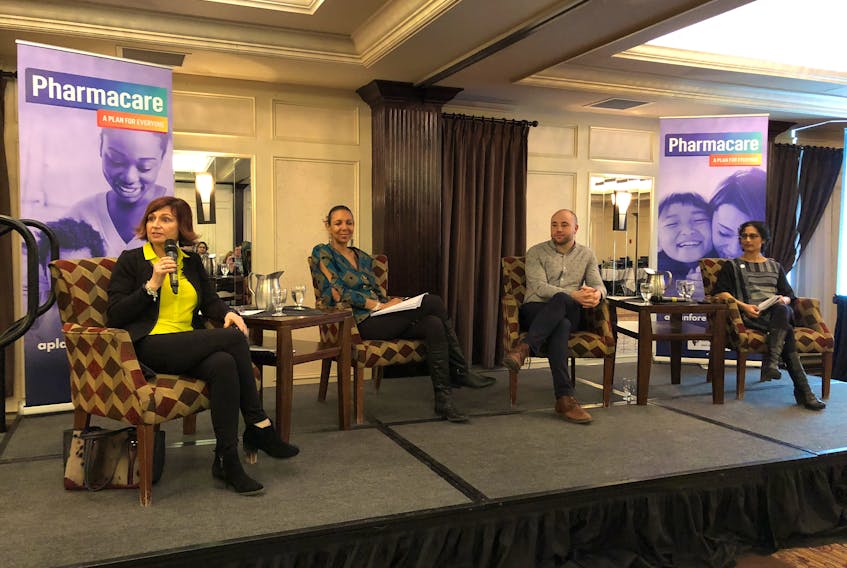About 60 people gathered at the Comfort Inn Airport in St. John’s Monday night for the Canadian Labour Congress’s (CLC) national town hall tour on pharmacare — an opportunity for the public to hear from health-care experts about universal prescription drug coverage.
Four speakers offered their thoughts on pharmacare, and the opinions were unanimous — Canada needs universal pharmacare now.
Nurses recounted horror stories of what happens to their patients when they can’t afford prescriptions.
Registered nurse Yvette Coffey mentioned a specific situation she’s seen several times.
“I’ve seen patients come in and have coronary artery stenting done, and then they have to go on a pill called Clavix to keep that stent open, and they can’t afford it. Then they end up back in the hospital and we’re re-stenting them. That costs thousands upon thousands of dollars.”
One statistic repeated throughout the evening was from a recent Angus Reid survey, which found that one in four people in the province don’t take their medications as prescribed because they can’t afford them.
One of the event’s speakers, Dr. Monika Dutt, a family physician and board member of Canadian Doctors for Medicare, said Canada should follow the lead of New Zealand — a smaller country that has made universal pharmacare work so well that it is paying 90 per cent less for generic drugs than Canada is. Ironically, many of those drugs are made in Canada.
“Study after study after study has shown that if Canada does the same we cannot only expand access to everyone who needs it, but save $4 billion to $7 billion a year in the process. If New Zealand can do it, surely, we can, too,” Dutt said.
The reason Canada doesn’t have that system in Canada, according to CLC secretary-treasurer Marie Clarke Walker, is a lack of political will and the huge influence of pharmaceutical companies.
“Ask me? It’s about gouging. It’s about greed,” she said.
Debbie Forward, president of the Registered Nurses’ Union in the province, said 3.5 million Canadians can’t afford to fill their prescriptions, and people are making life or death decisions about whether they should feed their children or buy life-saving drugs.
“Nurses know every day, and we see it every day in our work, when people can’t afford to take their medications, the impact it has on their health,” Forward said.
“That could be a man with hypertension who decides to take his blood pressure pill every second day rather than every day like he should because he just can’t afford to take it every day. We see that man admitted to hospital because, as a result, he’s had a stroke. Or, it could be the young mother who’s just been diagnosed with depression, who does not fill her second prescription for her antidepressant medications. She can’t afford them because there’s higher family costs now with a new baby. So, she chooses formula or diapers.”
The speakers acknowledged the federal budget tabled last month that announced an advisory council on the implementation of national pharmacare.
Walker said “that’s all good and well,” but she’s waiting to see it actually started.
“I don’t think we need any more studies. We don’t need any more promises. We need it to be implemented and implemented now,” she said to applause from the audience.
Dutt was also concerned that the advisory council may include people with a financial interest in preventing universal pharmacare.
“Insurance companies, pharmaceutical companies, of course they should be consulted, they’re part of that process, but they should not be part of the advisory council. The public interest needs to come first.”
MHA Gerry Rogers attended the event and spoke about a young mother in her district who needs a diabetes pump but can’t afford it, and because she is older than 25 she doesn’t qualify to have the pump covered by the province.
“She takes five needles a day, and she has children. She’s not permitted to have the pump, it’s not provided, there’s no way she can afford it, and she periodically ends up in hospital because of infections from her needle sites. Then her children have to be taken into care by the public services while she’s in hospital for a few days, and this is a recurring thing.”
People at the town hall agreed that these sorts of situations should not happen, referring to the fact that Canada is the only Organisation for Economic Co-operation and Development member country with universal health care that doesn’t include pharmacare.
Attendees left with plans to put more pressure on politicians to make universal pharmacare a reality, and to tell their friends and family members to do the same.
“It’s time to close this glaring gap in medicare,” Dutt said.
Twitter: juanitamercer_









